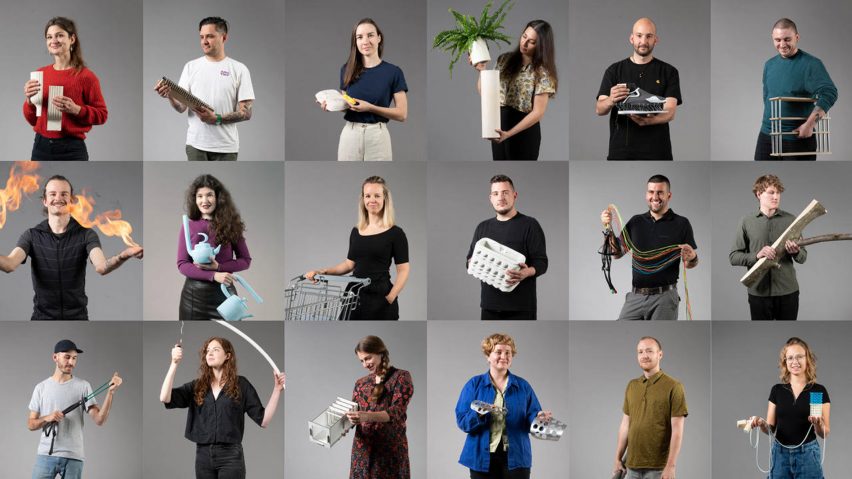
Lucerne School of Art and Design presents nine student design projects
Dezeen School Shows: a thermo-electric charger for smartphones and deconstructed wind instruments are featured in Dezeen's latest school show by object design students studying at Lucerne School of Art and Design.
Also featured are alternatives to limited-lifecycle skate shoes and 3D-printed concrete panels that can create new habitats for wildlife on building surfaces.
Lucerne School of Art and Design
Institution: Lucerne University of Applied Sciences and Arts
School: Lucerne School of Art and Design
Course: Bachelor Object Design
Tutors: Christoph Schindler, Thai Hua, Mònica Gaspar, Florian Hauswirth, Christof Sigerist, Thomas Zirlewagen, Andreas Saxer, Dagmar Johanna Steffen, Johanna Lier, Michael Niederberger, Samuel Perret, Thomas Skelton-Robinson and Nora Wagner
School Statement:
"What is the aim of today's design? What is my responsibility as a designer? What does the world need?
"Including special and new needs, studies covering material cycles and behavioural economics – object designers think and design products for a future-proof society.
"The Object Design course consciously positions itself in specific situations – precisely there, where our graduates can assume responsibilities themselves: between existing job categories, established product genres, manufacturing techniques and material groups; between socio-culturally anchored patterns of thinking, behaviour and diet.
"In their Bachelor-Projects, object designers build on their passions, experiences and previously gained skills to formulate their own unique outlook."
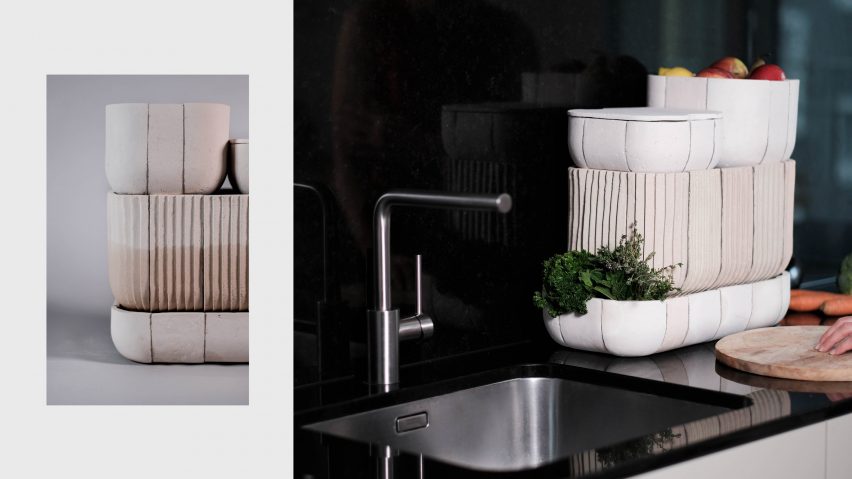
Versatile by Amandine Voillat
"Versatile offers a sustainable solution to preserve fruit and vegetables, which is meant as an alternative to the compressor refrigerator.
"The object cools the contents using only evaporative cooling. By virtue of its modularity, different climates can be created, providing foodstuffs with individual storage.
"The production involves the making of shaped ceramic tiles, and by arranging them in variation, numerous different geometries can be formed.
"Versatile guarantees that fruit and vegetables are treated with greater consideration."
Student: Amandine Voillat
Course: Bachelor Object Design
Tutors: Florian Hauswirth and Dagmar Steffen
Email: amandine.voillat[at]hotmail.ch
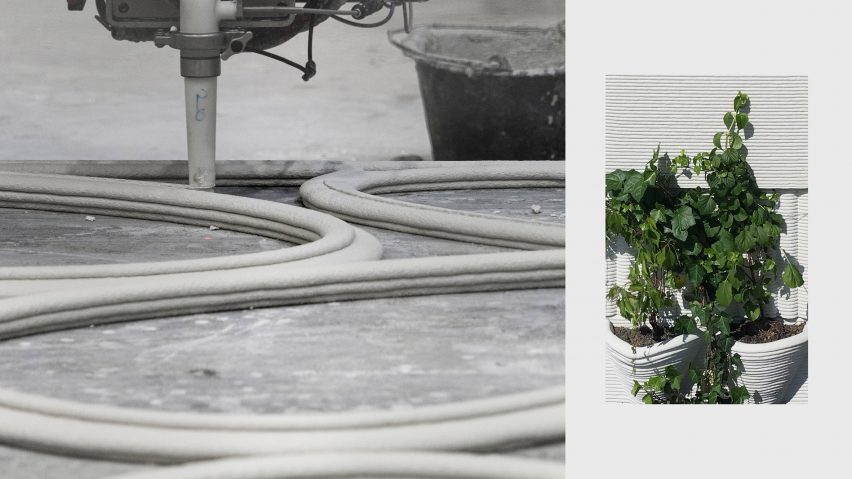
Fyton by Pascal Stutz
"Shrinking habitats for flora and fauna are a threat to biodiversity in Switzerland. Simultaneously, increasing building development and intensive farming methods leave fewer remaining spaces for biodiversity to flourish.
"Using flexibly implementable 3D concrete-printing technology, Pascal Stutz designs concrete panels that can be mounted on building facades in Swiss cities, providing new habitats for plants and animals on vertical surfaces."
Student: Pascal Stutz
Course: Bachelor Object Design
Tutors: Christof Sigerist and Dagmar Steffen
Email: pronto[at]pascalstutz.ch
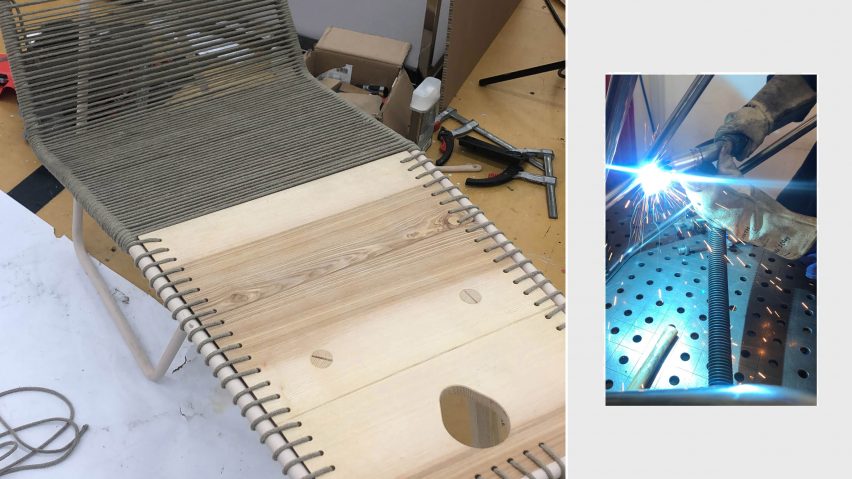
Aurula deckchair by Andreas Vögtlin
"The Aurula deckchair is Latin for light breeze and was created out of the tension of juxtaposing a Stabelle, a peasant chair from the Alpine regions, and a Silla Acapulco, a Mexican deckchair from the 1950s.
"Aurula blends the 'language' of both source objects. The adopted connections recombine their characteristics, creating a new affinity."
Student: Andreas Vögtlin
Course: Bachelor Object Design
Tutors: Thai Hua and Johanna Lier
Email: a.voegtlin[at]hotmail.com
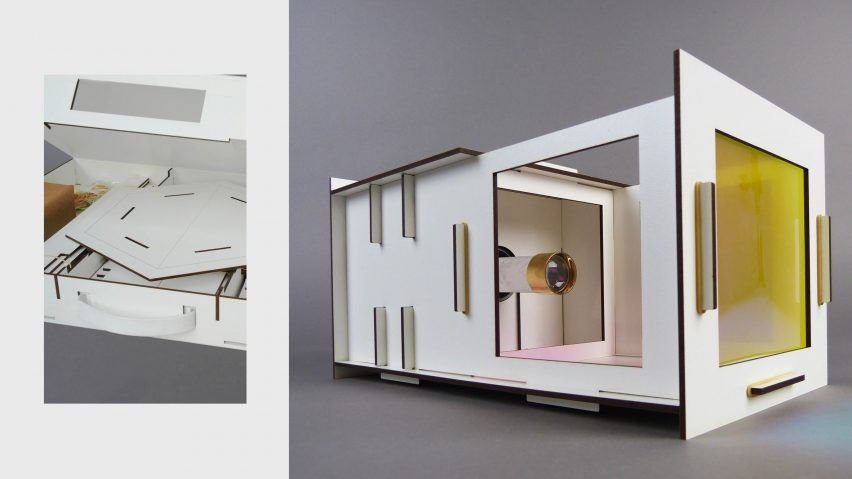
One Step Forward by Simone Wohnlich
"How can a culture of sharing be lived in our individual everyday lives? What are the opportunities to achieve it?
"Simone Wohnlich's sharing workshop familiarises different groups of people with this topic.
"He makes a culture of sharing palpable by promoting an understanding of a culture of 'use instead of ownership' amongst the participants.
"Deploying different perspectives and collaborative endeavours, Wohnlich makes sharing experience for the participants in the practicable sense.
"In the attached theme kit, the workshop leaders can find a targeted selection of materials and tools to simplify the act of sharing amongst the attendees and to sensitise them for environmentally friendly patterns of consumption."
Student: Simone Wohnlich
Course: Bachelor Object Design
Tutors: Andreas Saxer and Mònica Gaspar
Email: wosi554[at]gmail.com
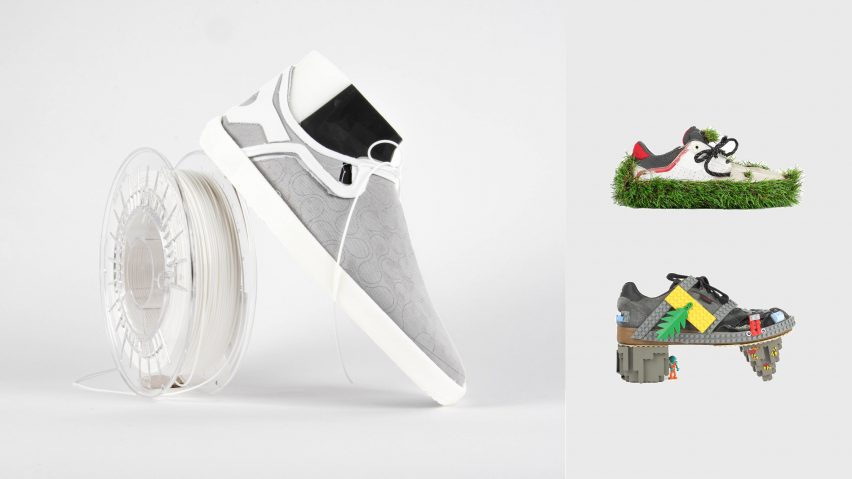
Re-Think Skate-Shoes by David Zuber
"With a lifespan of around 100 hours, skate shoes play a large part in the problem that 25 billion shoes are thrown away every year, with only five per cent of them integrated into downcycling processes.
"David Zuber's work fundamentally questions the meaning of sustainability in relation to skate shoes and their composition.
"Using these insights, he demonstrates possible approaches and provides food for thought about how to make skate shoes more sustainable."
Student: David Zuber
Course: Bachelor Object Design
Tutors: Thai Hua and Dagmar Steffen
Email: david-zuber[at]gmx.ch
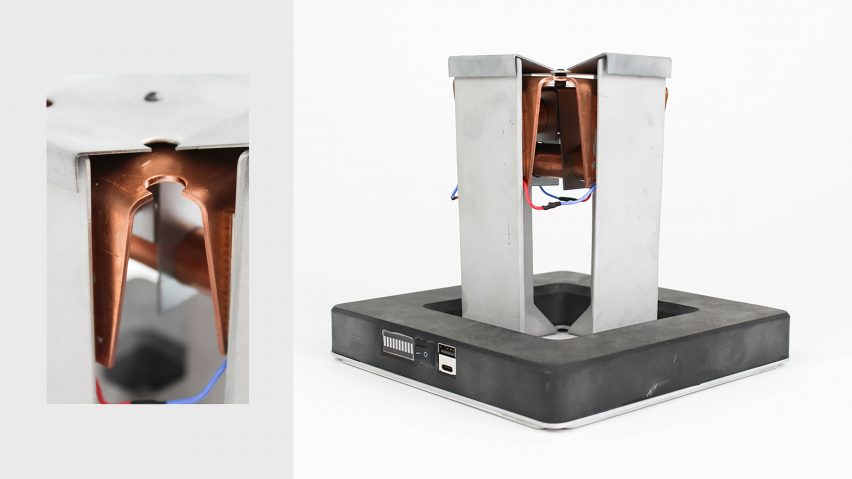
Thermocharged by Luca Ziörjen
"Domestic tourism is booming – the mountains are calling. Tranquillity, solitude and adventure in the wilderness lure more and more people up to high altitudes, whereby the number of emergencies also grows.
"Making a distress call requires not only good reception but above all a charged smartphone.
"Luca Ziörjen's goal is to make his own smartphone, and other devices, as independently chargeable as possible.
"To this end, he has designed a thermo-electric charging device that generates power through heat."
Student: Luca Ziörjen
Course: Bachelor Object Design
Tutors: Andreas Saxer and Johanna Lier
Email: luca-z[at]hotmail.com
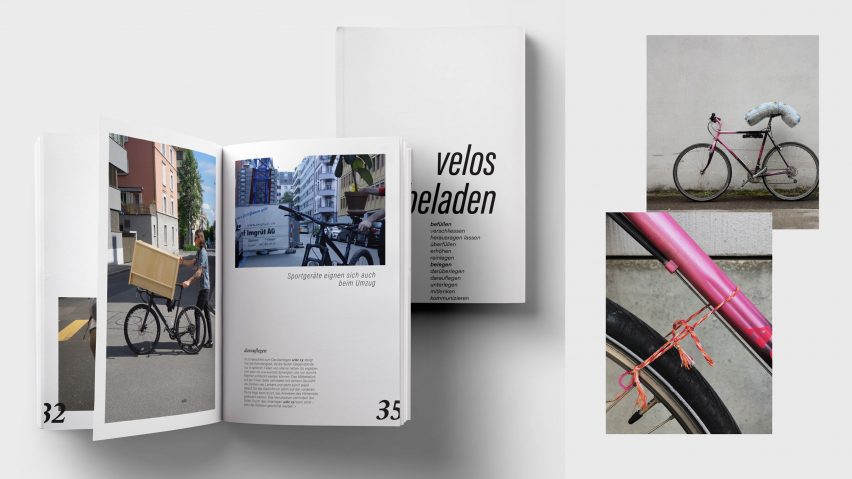
Loading Bikes by Jonas Zahno
"Things are decisively co-shaped by their use, in the sense that they are set in a context, reinterpreted, repurposed or even modified.
"In this way, improvisation and misappropriation can open up new perspectives and ways of thinking.
"It becomes inevitable in this process that interaction is found with things that already preexist, which in turn is effective as a resource-saving action strategy.
"Set against this background, Jonas Zahno examines the bicycle as a means of transport that is multi-loadable.
"This function-focused approach demonstrates strategies and potentials for how everyday transportation trips can be undertaken with the bike without having to resort to new products."
Student: Jonas Zahno
Course: Bachelor Object Design
Tutors: Christof Sigerist and Mònica Gaspar
Email: jonas.zahno[at]protonmail.ch
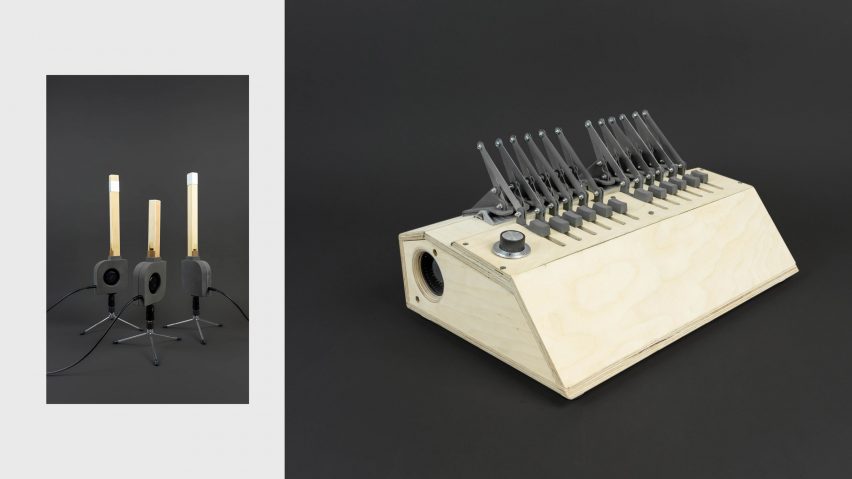
Evolving Dronescapes in cooperation with Tobias Lanz by Simon Lanz
"The project evolving dronescapes is a result of the joint work of the brothers Simon and Tobias Lanz.
"It combines installational aspects with experimental interfaces, in the process deconstructing the traditional pipe organ. At the heart of the work are the organ-like wind instruments constructed by Simon Lanz.
"Tobias Lanz has composed a performance for and with these instruments for his bachelor thesis in sound arts at the Bern University of Arts. It addresses the perception of organs as traditional church instruments.
"The physical presence and the tonal connections between the instrument and the room play a central role in the performance."
Student: Simon Lanz
Course: Bachelor Object Design
Tutors: Florian Hauswirth and Dagmar Steffen
Email: simon.lanz[at]hotmail.com
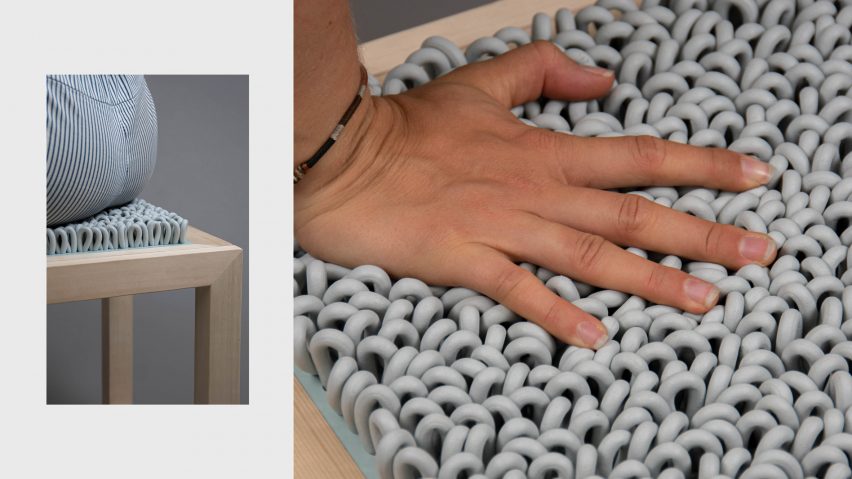
Unexpected by Jamie van Duuren
"Jamie van Duuren explores the haptic experience and interaction between people and materials.
"When our acquired knowledge and our corresponding expectations of materiality fail to match our sensory perception, tactile experience produces an unforeseen feeling of surprise.
"Unexpected is a series of tests involving the potential of materials and technologies, concentrating on how a surface can vary, as required, between two conditions."
Student: Jamie van Duuren
Course: Bachelor Object Design
Tutors: Andreas Saxer and Thomas Zirlewagen
Email: jamievanduuren[at]bluewin.ch
Partnership content
This school show is a partnership between Dezeen and Lucerne School of Art and Design. Find out more about Dezeen partnership content here.